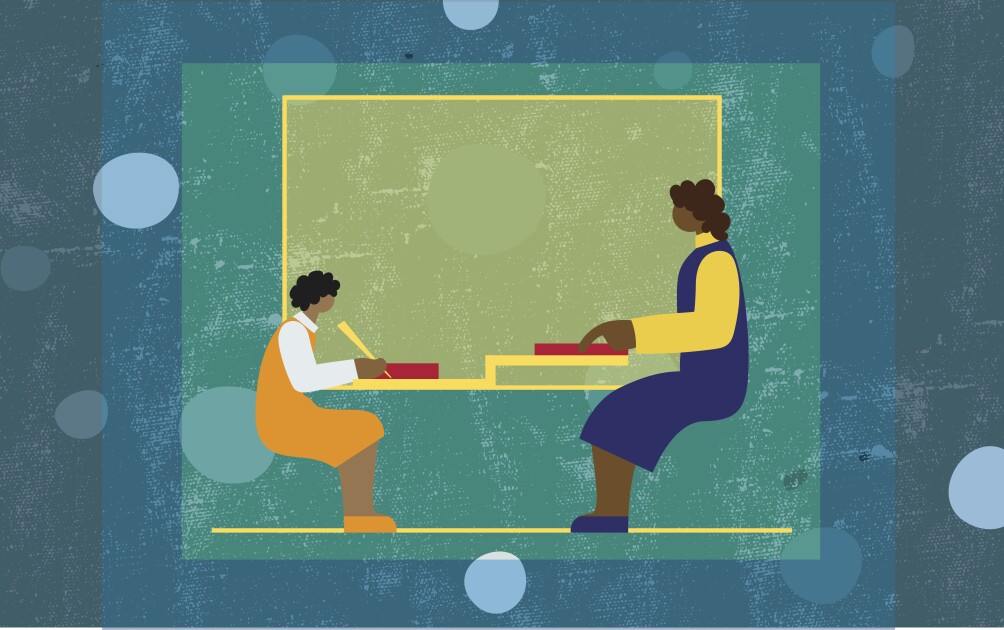When teams of Georgia educators met to discuss how best to revise math education in their state, they agreed to look east for inspiration—the Far East, that is. Obscured by all the debate over the state’s proposed science and history standards are ones for mathematics that have been injected with a healthy dose of Asian influence.
Because students in Japan ranked high—fourth—on the Third International Mathematics and Science Survey, a test that was administered in 38 nations in 2001, the educators decided to base Georgia’s new math standards on that country’s system.
Georgia educators found the Japanese curriculum model appealing for its coherence, said Carolyn Baldree, a mathematics education program specialist with the state education department. Instead of separating algebra from chemistry and so forth, Japanese teachers introduce concepts in the same class. As students progress through the grades, their math lessons build on what they have previously learned, she explained.
In kindergarten through 4th grade, under the proposed standards, Georgia students would work on building a strong base of knowledge in basic arithmetic skills. They would start learning about proportions and percentages in 4th grade. And in the 7th and 8th grades, they would start to learn algebra and geometry, according to Ms. Baldree.
By the time students finished the 8th grade, they would have completed the equivalent of an Algebra 1 class, Ms. Baldree said. Georgia students typically complete that subject at the end of 9th grade.
High School Blend
At the high school level, subjects such as Algebra 1, geometry, and trigonometry would blend together instead of being taught in separate courses. In addition, students would learn more statistics than what is currently taught, Ms. Baldree said.
Such an “integrated,” or coherent, approach is common in other countries, according to Johnny Lott, the president of the National Council of Teachers of Mathematics, in Reston, Va.
“Most countries around the world use integrated math,” Mr. Lott said. “It is not unheard of” in the United States, he said, “but it is not widely used.” For instance, he cited New York as one state where integrated math is currently being tried.
One benefit of melding concepts in math courses is that it gives students more options for solving a problem, said Mr. Lott, a professor of mathematical sciences at the University of Montana-Missoula.
“When a problem comes up, students can use the math they need to solve it, instead of saying, ‘This has to be geometry,’” he said. “Integrated math breaks down the barriers.”
Across the grades, math would have fewer standards for Georgia students to explore in depth, Ms. Baldree said.
Introducing advanced concepts in the lower grades and crafting fewer standards are the same strategies Georgia used to draft the state’s proposed content for science and social studies, both of which have come under fire. (“Ga. History Plan Stirs Civil War Fuss,” Feb. 18, 2004.)
Too Sketchy?
The state school board is scheduled to vote on all the proposed standards in June.
Even though the proposed math standards have not been as hotly debated as others, some educators in the state are concerned that they lack enough detail.
An early draft of the standards lacked “clarity about what it is you are trying to do,” said Tom Trotter, the head of the mathematics department at the Georgia Institute of Technology, in Atlanta.
More specifics about the topics covered, students’ skill levels, and sample work need to be included, he said, adding that other mathematicians in the state have expressed similar concerns.
In addition, Mr. Trotter said the state education department would need to make sure that teachers were properly trained in how to use the curriculum effectively.
Teachers would have a full year to learn how to implement the proposed curriculum before actually using it, Ms. Baldree said. The curriculum and standards would be phased in over four years. Each year, teachers from different grades would receive training.
The teacher team that conceived the math standards has already revised them once in order to address critics’ concerns about clarity, Ms. Baldree said, and could do so again.
“We are open-minded,” she said, “because we want what is best for the kids of Georgia.”







